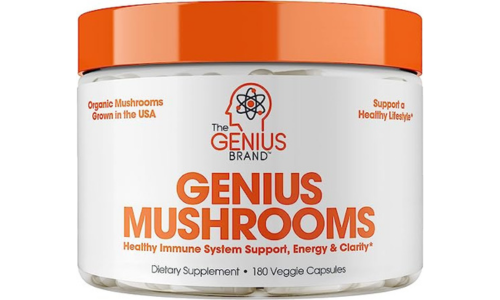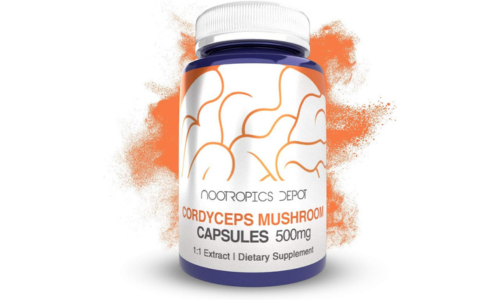
Ever hit that wall during your run and wished for a natural booster to kick your performance up a notch? Let me introduce you to Cordyceps mushrooms (The Zombie Fungus)– a secret weapon that could change your running game forever. Originally found in Tibet’s high and harsh terrains, these unassuming fungi were the secret sauce for locals to battle the thin air, get through their hard days, and keep going strong from sunrise to sunset. You know how tough high-altitude exertion can be if you’re a runner. Guess what? The world of sports science did the math, took a page from the Tibetan tradition, and turned this high-altitude secret into a modern-day game-changer. They found this ancient “super shroom” could be the key to unlocking new levels of athletic prowess. Now, Cordyceps is no longer a well-kept secret but a performance-boosting supplement on every runner’s radar.
What are Cordyceps?
As runners, we’re always looking for that extra kick, that natural booster that gives us an edge. Cordyceps, a ‘super shroom’ that’s making waves in the fitness world, might be just what you’re looking for. But what are these fungi all about?
Origins and Varieties
Cordyceps are an unusual group of fungi with over 400 known species. But for us runners, two are of special interest: Cordyceps sinensis and Cordyceps militaris. These two varieties hail from the demanding high-altitude landscapes of Tibet, adapting to thrive in harsh conditions – something us runners can definitely relate to.
The Zombie Fungus
Now, about that “zombie fungus” nickname. Cordyceps have a wild lifecycle that’s straight out of a horror movie – infecting insects, taking over their bodies, and sprouting from them. It’s nature at its weirdest! Interested in the gory details? Dive into our blog post about “The Zombie Fungus That Takes Over Insects: Cordyceps Explained”.
Cost and Production
Let’s address the dollar signs. C. sinensis is indeed the more expensive of the two, and for good reason. It’s naturally found in the wild and has to be handpicked, which justifies its higher price tag. On the other hand, C. militaris is lab-grown, which makes it a more budget-friendly choice without sacrificing the benefits.
In fact, research has shown that C. militaris may be even more effective for energy production. This is due to its higher concentration of cordycepin, a compound that plays a crucial role in energy transfer within our cells. But more on that later.
There you have it, folks. Cordyceps are unique fungi that could pack a punch in your running routine. Stay with us to understand how they work their energy-boosting magic in our bodies.
“Fungi Power” in the ’93 Olympics: An Unforgettable Display

One of the most defining moments in the world of athletics that put Cordyceps on the map was the 1993 Chinese Women’s Olympic team’s awe-inspiring performance. This team didn’t just win; they dominated. They bagged an incredible 9 world records, an achievement that took the world by surprise and had everyone asking: “What’s their secret?”
The Breakthrough Moment for Cordyceps
The secret, according to their coach, was a combination of intense high-altitude training and a not-so-secret ingredient: Cordyceps. These fungi, coupled with their grueling training regime, were credited for the team’s superhuman stamina and speed. It was an announcement that echoed through the sports and scientific world, putting the spotlight firmly on Cordyceps as a potential athletic game-changer.
What Made the Difference?
Now, we could debate all day about whether it was the Cordyceps, the high-altitude training, or a bit of both that propelled these athletes to their record-breaking success. It’s tough to say for sure. The thin air of high altitudes naturally increases the body’s red blood cell count, improving oxygen supply to muscles and boosting endurance. Could Cordyceps, with its energy-boosting properties, have amplified these effects? It’s a tantalizing thought, isn’t it?
Ultimately, what we do know is that the ’93 Chinese Women’s Olympic team’s staggering performance encouraged more scientific exploration of Cordyceps and its potential benefits. So, whether you believe in the “Fungi Power” or not, one thing’s for sure: that Olympic moment was a massive breakthrough for Cordyceps and its journey in the sports world.
Controversy
Before we go any further, let’s address the elephant in the room. Yes, there have been later controversies around Chinese athletic programs, with revelations of systemic doping, including the use of illegal performance-enhancing drugs. But let’s be clear – there’s no concrete evidence linking these doping scandals directly to our ’93 champions. So, let’s give credit where it’s due – for their remarkable feats, and for putting Cordyceps on the global athletic map.
So, as a runner, where do you stand? Could Cordyceps be your ticket to a new personal best? We’ll delve deeper into the science and studies behind Cordyceps in the next sections. Stay tuned!
Famous Athletes and Speculated Cordyceps Use
Frank Shorter: Shorter is an American long-distance runner who won the gold medal in the marathon at the 1972 Summer Olympics. He is said to have used cordyceps to help him train for the Olympics.

Joan Benoit Samuelson: Samuelson is an American long-distance runner who won the gold medal in the marathon at the 1984 Summer Olympics. She is also said to have used cordyceps to help her train for the Olympics.

Abebe Bikila: Bikila is an Ethiopian long-distance runner who won the gold medal in the marathon at the 1960 and 1964 Summer Olympics. He is said to have used cordyceps to help him recover from injuries.

Steve Prefontaine: Prefontaine was an American long-distance runner who was considered one of the greatest runners of all time. He is said to have used cordyceps to help him train for races.

It is important to note that there is no scientific evidence to prove that cordyceps actually helped these athletes perform better. However, these athletes all have a history of using cordyceps, and they all achieved a high level of success in their respective sports.
It is also important to note that cordyceps is not a miracle supplement. It is not going to make you a better athlete overnight. However, it may be able to help you improve your performance if you are already training hard and eating a healthy diet.
Unleashing the Runner’s High: The Cordyceps Effect
Ever felt like you’re hitting a wall during your run like there’s a performance barrier you just can’t push through? Many athletes have been there. But what if a simple supplement could help you break through that wall? Let’s take a deep dive into the benefits of Cordyceps for running.
Boosting Energy and Endurance
Every runner knows the struggle of energy depletion. You’re halfway through your high-intensity exercise routine, and suddenly you’re running on fumes. That’s where ATP, or adenosine triphosphate, enters the scene. ATP is like your body’s energy currency. Cordyceps supplements, particularly those using Cordyceps sinensis and Cordyceps militaris extracts, can help increase ATP production in the body. In other words, Cordyceps could give you the energy boost needed to enhance your exercise performance and endurance.
Enhancing Oxygen Utilization and Aerobic Capacity
Oxygen utilization, or VO2 max, is a measure of the maximum amount of oxygen your body can use during intense exercise. A higher VO2 max means better aerobic fitness and, therefore, better exercise endurance capacity. Cordyceps have been shown to help improve oxygen utilization, giving you an edge in your aerobic performance.
Promoting Lung Health and Reducing Fatigue
Good lung health is crucial for endurance exercise performance. the Cordyceps mushroom, a staple in traditional Chinese medicine, has long been used for promoting lung health and reducing fatigue. In other words, these medicinal mushrooms could help you breathe easier and reduce the fatigue often associated with prolonged exercise.
The Cordyceps Reality Check
Despite the potential health benefits and the promise of enhancing aerobic capacity, it’s important to keep expectations realistic. Cordyceps are not a magic bullet. Think of them as one part of a balanced approach to health and fitness. They can supplement your training but won’t replace the need for a balanced diet, regular exercise, and adequate rest.
With all that said, the benefits of Cordyceps for running are intriguing. If you’re looking for a natural way to potentially improve exercise performance, endurance, and overall health, Cordyceps supplements might be worth exploring.
Unlocking Enhanced Exercise Performance: The Cordyceps Militaris Study
This research, published in the Journal of Dietary Supplements, explores the effects of a Cordyceps militaris-based mushroom blend on exercise performance in healthy older adults. The study found that after three weeks of supplementing with the Cordyceps-based blend, the participants experienced a significant improvement in their exercise performance.
Specifically, the research highlighted the blend’s positive effects on metabolic thresholds – the points at which lactic acid starts to accumulate in the bloodstream during increasing exercise intensity. Participants in the study showed an increase in their ventilatory threshold (the point during exercise at which breathing becomes more labored) and lactate threshold (the exercise intensity at which lactic acid starts to accumulate in the blood).
These threshold improvements suggest that Cordyceps supplementation could potentially delay the onset metabolic threshold, of muscle fatigue and exhaustion during high-intensity exercise, enhancing endurance exercise performance. This is particularly relevant for runners, who often face these threshold barriers during long-distance runs or sprints.
It’s important to note that this study focused on older adults, so while the results are promising, further research is needed to explore the effects of Cordyceps supplements on different age groups and athletic abilities..
Boosting Tolerance to High-Intensity Exercise: The Second Cordyceps Militaris Study
Yet another piece of research in the Cordyceps puzzle comes from a 2012 study published in the journal Biochemical and Biophysical Research Communications. This research takes us down to the cellular level, examining how Cordyceps impacts our muscle cells.
So, what did they find? It turns out that Cordyceps supplementation boosted ATP levels in human skeletal muscle cells. Remember, ATP (adenosine triphosphate) is like the energy currency for our cells. More ATP means more energy for your muscles to contract and work, which can directly influence your running performance.
Even more intriguing, the researchers found that Cordyceps not only increased ATP levels but also revved up the activity of genes involved in ATP production. It’s like Cordyceps was not only fueling the car but also tuning up the engine for better performance!
But what does this mean for you as a runner? The study suggests that Cordyceps might help your muscles work harder and longer during your run, thanks to these increased ATP levels. And that might just give you the edge you need to push your performance to the next level.
Thoughts on the Clinical Trials
It’s important to note that the world of scientific research isn’t always a clear-cut case of success or failure. Some studies on Cordyceps have shown less promising results, with minor or even no significant improvements in exercise performance. And that’s totally fine and to be expected. After all, human bodies are complex, and what works like a charm for one person might have a less dramatic effect on exercise testing for another.
It’s also worth mentioning that many studies, including the first one we discussed, have suggested that Cordyceps may work best when taken in combination with other medicinal mushrooms or adaptogens like rhodiola rosea-based supplementation. This concept, known as ‘stacking,’ involves combining different supplements to enhance their overall effect. It’s a bit like a relay team in a race, where each runner (or in this case, supplement) brings their unique strengths to achieve a collective win.
In the next section, we’ll delve deeper into this fascinating topic of stacking Cordyceps with other adaptogens to potentially get the most out of your supplement regimen.
How Do Cordyceps Supplements Make You Feel?
Reflecting on the many reviews and my personal journey, incorporating Cordyceps into my training regimen was like gaining a discreet ally. For us runners, every ounce of sustained energy makes a difference, and Cordyceps appears to offer just that.
Think back to my half marathon training period; I’d been grappling with a persistent performance plateau. Those final miles always seemed to demand more from me than I could muster. That’s when Cordyceps entered my routine, suggested by a running friend. Gradually, I began to feel an increase in my staying power. Those miles, which once felt like a brick wall, started to resemble a hurdle that I was prepared to leap over.
But let’s entertain a dose of skepticism here – could this have been a placebo effect? Possibly. Our minds are powerful, and believing in the impact of Cordyceps could have spurred me on. But, placebo or not, I felt an undeniable change in my endurance, and I was smashing personal records that had stood unchallenged for months.
So, while Cordyceps isn’t a magic solution that can replace the fundamental pillars of training, rest, and nutrition, it can certainly serve as a valuable adjunct on your quest for better running performance.
What Stacks Best With Cordyceps?
When it comes to stacking Cordyceps with other nootropics for enhancing athletic performance and overall well-being, several options are highly rated by the scientific community and users alike. Here are a few you might consider:
Rhodiola Rosea: Known for its stress-busting and fatigue-fighting properties, Rhodiola Rosea is a powerful adaptogen that can pair well with Cordyceps. It can help improve mental performance under stress, making it a popular choice among athletes and busy professionals.
Lion’s Mane: This medicinal mushroom is famous for its potential cognitive-enhancing benefits. Stacking Lion’s Mane with Cordyceps could offer a combination of improved mental clarity and physical performance.
Bacopa Monnieri: Known for its memory-enhancing properties, Bacopa Monnieri can complement the physical performance benefits of Cordyceps by boosting cognitive function.
Panax Ginseng: Used in traditional Chinese medicine for centuries, Panax Ginseng can help increase energy levels and improve physical stamina, making it a fitting companion for Cordyceps.
For an article on Adaptogens, CLICK HERE!
While all these options can potentially offer added benefits when stacked with Cordyceps, your personal recommendation of Rhodiola Rosea from Nootropics Depot and Genius Mushroom are also excellent choices. Both have received positive reviews from users and are known for their quality and efficacy.
Choosing a Quality Cordyceps Supplement
Finding the right Cordyceps supplement can feel like running a marathon, but I’ve done the legwork for you. Here’s what I’ve found: Nootropics Depot’s Cordyceps Militaris Whole Fruiting Body Medicinal Mushroom Extract Capsules tick all the right boxes.
It’s crucial to choose a supplement with Cordyceps militaris, known for its high concentration of beneficial compounds and sustainability. This product is made from the whole fruiting body of Cordyceps, meaning you’re getting the full spectrum of its goodness.
What really stands out for me is the supplement’s minimum β-Glucan content of 25%. β-Glucan is a powerhouse for boosting immunity. Plus, it has a cordycepin content of at least .2%, confirmed by HPLC. Cordycepin is unique to Cordyceps and offers a host of health benefits.
I’ve got to tell you, having been a long-term user of Nootropics Depot products, I can vouch for their quality and transparency. They’ve always delivered top-notch, ethically-produced supplements that I trust.
So, if you’re considering adding a Cordyceps supplement to your regimen, I’d strongly recommend Nootropics Depot’s Cordyceps Militaris Capsules. Trust me, your running game will thank you!
Optimizing Your Running Game: Stacking Cordyceps with Rhodiola and or The Genius Mushroom
While Cordyceps can definitely pull its weight when taken alone, research and anecdotal evidence suggest that it truly shines when stacked with other nootropics. And while Nootropics Depot offers excellent individual supplements, there’s one combo supplement that has caught my eye: the Genius Mushroom.
I recommend combining your Cordyceps Militaris supplement from Nootropics Depot with Rhodiola for the ultimate runner’s stack. And for those who prefer a convenient, all-in-one solution, Genius Mushroom could be your go-to.

Genius Mushroom is a top-rated supplement that combines three potent medicinal mushrooms: Cordyceps, Lion’s Mane, and Reishi. This powerful trio targets various aspects of health and performance – from energy and endurance enhancement (thanks to Cordyceps) to cognitive boost (Lion’s Mane), and immune support (Reishi).
In short, whether you’re stacking your own supplements or looking for a comprehensive mushroom blend, both Nootropics Depot and Genius Mushroom offer high-quality options to boost your running game and overall well-being.
What’s more, Genius Brand has a strong reputation for quality and transparency. Their products are tested for purity and potency, ensuring you get exactly what’s on the label – no hidden surprises.
For a Full Review of the Best Nootropics, CLICK HERE!
Side Effects and Risks?
Cordyceps supplements are generally considered safe for most people, including runners and athletes. However, like any supplement, they may cause some side effects in certain individuals or when taken in large amounts. These can include:
Digestive Upset: Some people might experience nausea, diarrhea, or dry mouth.
Hypoglycemia: Cordyceps might lower blood sugar levels. This could be a concern for people with diabetes or low blood sugar and for those taking medication that affects blood sugar levels.
Bleeding: There’s some evidence that Cordyceps might slow blood clotting, which could increase the risk of bleeding in people with bleeding disorders or during surgery.
Autoimmune Diseases: Cordyceps might cause the immune system to become more active, potentially worsening symptoms in people with autoimmune diseases like lupus or rheumatoid arthritis.
Allergies: Though rare, some people may have allergic reactions to Cordyceps.
It’s always important to start with a small dose to see how your body reacts and consult your healthcare provider before starting any new supplement regimen, especially if you have underlying health conditions or are taking other medications.
Suggested Dosage?
When it comes to supplementing with Cordyceps, the dosage can vary based on several factors, including the individual’s age, overall health, exercise metabolism, and specific fitness goals. As a general guideline, many supplements recommend a daily dosage of 1,000 to 3,000 mg of Cordyceps extract.
When stacking Cordyceps with other supplements, the dosage might need adjustment. Stacking, by nature, means you’re combining different supplements, each with its own recommended dosages. So, it’s crucial to consider the cumulative effect of all these supplements to avoid overdoing it.
For instance, if you’re stacking Cordyceps with Rhodiola, you’ll need to consider the recommended dosage for Rhodiola as well, which is typically around 200-600 mg per day.
Remember, everyone’s body responds differently to supplements. What works well for one person might not work the same for another. It’s always best to start with a lower dose to assess tolerance, then gradually increase as needed.
Final Thoughts
In our exploration of Cordyceps, it’s evident that these mighty mushrooms offer substantial benefits for runners, particularly when stacked with other potent supplements. Their energy-boosting, lung-enhancing properties can truly give your running game a leg up.
More than that, Cordyceps carry a host of overall health benefits that extend beyond the running track. So, whether you’re chasing a personal record or just enjoy the thrill of a run, adding Cordyceps to your routine could be a game-changer. It’s worth considering these natural powerhouses as a valuable teammate in your running journey.
FAQ’s
Q: How can consuming Cordyceps improve endurance exercise performance?
A: Cordyceps can boost endurance performance by increasing the body’s adenosine triphosphate (ATP) production, which delivers energy to our muscles. This can help reduce fatigue and enhance the body’s ability to perform prolonged exercise.
Q: Can Cordyceps mushrooms increase antioxidants in my body?
A: Absolutely. Cordyceps contain natural antioxidant properties, which can help fight oxidative stress in the body. This makes them a great supplement for trained athletes looking to boost their exercise routine and overall health.
Q: How does a Cordyceps supplement fit into an alternative and complementary medicine approach?
A: As a medicinal mushroom, Cordyceps are often used in traditional Chinese medicine to promote overall health and well-being. They can complement other natural supplements and therapies to help boost athletic performance, enhance immune function, and support heart health.
Q: Is it beneficial to take a Cordyceps supplement before a workout?
A: Yes, many people find that taking Cordyceps as a pre-workout supplement can help improve exercise capacity and reduce fatigue, allowing for a more effective and intense workout.
Q: What are the potential health benefits of Cordyceps extract?
A: Cordyceps extract offers a multitude of health benefits. Aside from boosting athletic performance and endurance, it can help improve heart health, support kidney function, increase antioxidants, and even offer anti-aging benefits.
Q: Are there significant benefits to choosing cultivated Cordyceps over wild Cordyceps?
A: Cultivated Cordyceps, especially Cordyceps militaris, can offer a more sustainable and ethical option compared to wild Cordyceps. Plus, they’re known to have a higher concentration of beneficial compounds such as cordycepin, offering greater benefits to the consumer.

